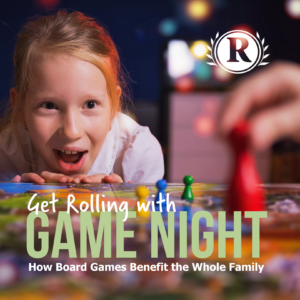
“I’m bored!” It’s the phrase that all parents dread hearing. Keeping kids entertained can feel like a full-time job; finding sources of entertainment that are actually engaging and beneficial is even trickier. What’s a family to do? Banish “bored” with board – games, that is! Board games aren’t just about drawing cards and moving pieces; they’re packed with benefits that can boost development, social skills, creativity, and connection. Most importantly, they’re fun!
Cheerful Challenges
Board games are great brain workouts. They can enhance critical thinking, decision-making, and strategic planning skills. As your child navigates through game scenarios, they learn to assess situations, manage emotions, make informed choices, and adapt strategies – all invaluable life skills.
Engage with Education
Board games aren’t just about amusement; they’re also powerful tools for education. Games that explore topics like math, reading, science, and history can be great ways to reinforce school concepts and broaden understanding about different subjects. Integrating educational board games into your family stash can provide targeted support while making learning an enjoyable adventure.
Bond Across the Board
Family board games create opportunities for open communication, cooperation, and healthy competition. Whether it’s a suspenseful race against a timer or a collaborative mission in a cooperative game, these moments of humor, joy, frustration, and triumph lead to meaningful conversations, laughter, and the chance to understand each other on a deeper level. You can even work together to craft your very own board game, adding a personal touch to your playtime and highlighting your family members’ unique interests and creativity.
Young Player Perks
Even the tiniest tots can reap the rewards of game night. Board games can aid in developing fine motor skills, hand-eye coordination, and spatial awareness. Games for young children often feature simple instructions and large, colorful pieces that are easy for little hands to manipulate. If your favorite games are geared toward an older age group, consider pairing small players with patient adults or older siblings as encouraging learning partners!
There’s no “right” age to start playing board games. When your child shows an interest in game mechanics, counting, or turn-taking, it might be the perfect time to introduce them to your family. So, roll the dice, draw a card, or spin to make your move; laughter, learning, and unforgettable moments are waiting!